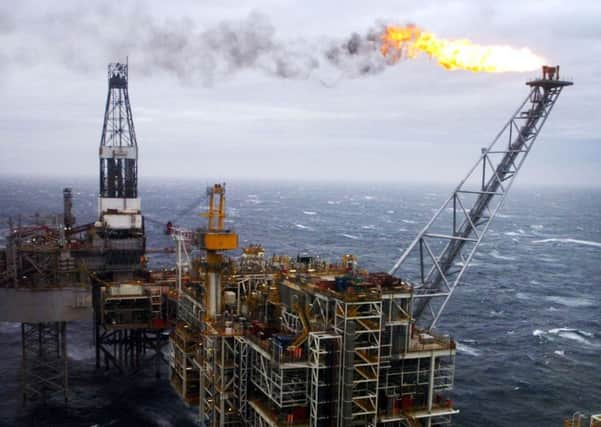Stricken North Sea faces ‘irreversible’ damage


Wood said oil companies were planning “shut-downs” and were working out what to do with their teams of engineers as the industry is faced with a slump that could cost many thousands of jobs.
Other experts have warned of cuts in capital budgets, shrinking salaries, the cancellation of new projects and falling contractor rates as the industry reels from the plummeting oil price. The dramatic downturn has seen the price of a barrel of oil fall from $110 in June last year to below the $50 mark last week.
Advertisement
Hide AdAdvertisement
Hide AdSpeaking at the end of a week that saw BP, ConocoPhillips and Schlumberger shed around 600 North Sea jobs, Wood said the industry was facing a “crisis of confidence”.
Wood renewed his call for the UK government to cut the supplementary tax on oil profits by at least 10 points within the next three weeks.
The businessman, who built up the Wood Group and is regarded as the foremost expert on the North Sea, said the measure had to be taken before Chancellor George Osborne’s March budget.
Crucially, he added that the government should make a lengthy commitment to the policy to give companies an incentive to keep investing in the off-shore industry during difficult times.
“There is a crisis of confidence, but any talk of the demise of the oil and gas industry is nonsense. But what is possible is irreversible damage such that won’t be able to maximise the recovery over the next 20-30-years,” Wood told Scotland on Sunday.
“The benefit of introducing a significant tax reduction now would only work if you make it clear we will maintain this tax regime into the medium-term future,” he added.
Wood’s comments came as it emerged that cash buyers, including sovereign wealth funds, are circling oil and gas companies, because they anticipate that an eventual upturn in price could yield big pay-offs.
According to analysts, the sector has become a buyers’ market as struggling oil and gas firms look for a ready supply of cash to service debts.
Advertisement
Hide AdAdvertisement
Hide AdWood predicted that the oil price would return to the $75/80 mark in nine months to a year’s time.
But the severity of the months ahead was underlined by Professor Alex Kemp, the Professor of Petroleum economics at Aberdeen University, who is regarded as one of the preeminent experts in his field.
“The price collapse from $110 dollars to $50 is an enormous change and makes an enormous difference to the income of the oil and gas sector,” Kemp said.
“As a consequence, capital budgets are being cut very substantially. And in our modelling, at a $50 price, a whole lot of projects – new projects – really are not viable pre-tax and post-tax it is worse.
“Exploration and new field developments are under threat and there is an open question about the extent to which investment will actually fall from now onwards.”
Kemp said the falling price has contributed to the industry losing money over the last year.
“If we look at the industry now for the year 2014, it will have a negative cash flow – that their costs will exceed their revenues,” said Kemp.
“We have had a very big investment over the last few years and the costs of these are still being incurred and the result is that the industry for 2014 will be cash flow negative. That’s a very serious matter.”
Advertisement
Hide AdAdvertisement
Hide AdKemp said contractor rates for companies had been cut by 15 per cent and drilling rig rates had fallen.
He also expected pay to be cut, pointing out that the oil and gas sector was very well paid, with salaries averaging £64,000 compared with the UK average of £26,000.
In a Treasury statement, the Chancellor said: “There is one part of our country where it’s a real challenge, and that’s the North Sea oil and gas industry, which is a really important industry for us.
“We have a record amount of investment in the North Sea. A lot of these investments take a long-term view but there’s no doubt the dramatic fall in the oil price has raised questions about future investment in the North Sea.
“In December, I announced some cuts in our oil taxes and set out the plan for the future.
“This month we have cut taxes in the North Sea and of course, with the Budget approaching we’re going to look at what more we can do to support investment there. I don’t want to pre-empt the Budget but I can see that it may well involve further reducing the burden of tax on investment in the North Sea.”
A government spokesman added: “The government is working with industry leaders as a matter of priority to address the challenges the industry faces.”